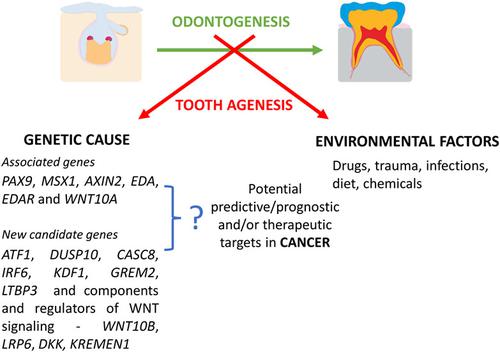当前位置:
X-MOL 学术
›
Clin. Genet.
›
论文详情
Our official English website, www.x-mol.net, welcomes your feedback! (Note: you will need to create a separate account there.)
Tooth agenesis: What do we know and is there a connection to cancer?
Clinical Genetics ( IF 3.5 ) Pub Date : 2020-11-29 , DOI: 10.1111/cge.13892 Ondrej Bonczek 1 , Premysl Krejci 2 , Lydie Izakovicova-Holla 3 , Pavlina Cernochova 3 , Igor Kiss 4 , Borivoj Vojtesek 1
Clinical Genetics ( IF 3.5 ) Pub Date : 2020-11-29 , DOI: 10.1111/cge.13892 Ondrej Bonczek 1 , Premysl Krejci 2 , Lydie Izakovicova-Holla 3 , Pavlina Cernochova 3 , Igor Kiss 4 , Borivoj Vojtesek 1
Affiliation

|
Like all developmental processes, odontogenesis is highly complex and dynamically regulated, with hundreds of genes co‐expressed in reciprocal networks. Tooth agenesis (missing one or more/all teeth) is a common human craniofacial anomaly and may be caused by genetic variations and/or environmental factors. Variants in PAX9, MSX1, AXIN2, EDA, EDAR, and WNT10A genes are associated with tooth agenesis. Currently, variants in ATF1, DUSP10, CASC8, IRF6, KDF1, GREM2, LTBP3, and components and regulators of WNT signaling WNT10B, LRP6, DKK, and KREMEN1 are at the forefront of interest. Due to the interconnectedness of the signaling pathways of carcinogenesis and odontogenesis, tooth agenesis could be a suitable marker for early detection of cancer predisposition. Variants in genes associated with tooth agenesis could serve as prognostic or therapeutic targets in cancer. This review aims to summarize existing knowledge of development and clinical genetics of teeth. Concurrently, the review proposes possible approaches for future research in this area, with particular attention to roles in monitoring, early diagnosis and therapy of tumors associated with defective tooth development.
更新日期:2020-11-29



























 京公网安备 11010802027423号
京公网安备 11010802027423号